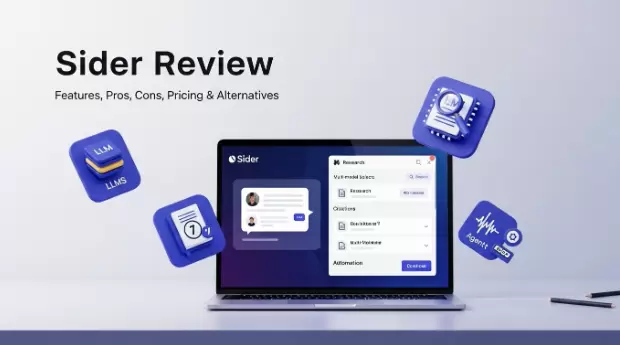In the digital age of today hiring requires much more than just posting jobs and picking out candidates by hand. Businesses must find clever yet efficient ways to simplify the hiring process as the demand for top talent increases. The best ways to recruit can help with that. In addition to reducing expenses and improving hiring quality, the right recruiting software can automate job posts to filter resumes and manage candidate lists that include AI into the hiring process.
In this article, we'll review the top recruitment software for what you need for hiring and assist you in choosing an ideal software for managing hiring.
What is Recruiting Software?
Recruiting software is simply a computer software designed to speed up and improve every step of the hiring procedure. Consider it the command headquarters for all of your attempts to recruit. This introduces you to the world of organized data-rich hiring and removes you from those disorganized manual practices.
This category includes a host of software, most commonly referred to as an Applicant Tracking System, or ATS. But today's platforms are often much more than just a simple system for tracking resumes. Many have expanded to include abilities in the field of sourcing, relationship management, team collaboration, analytics, and compliance. To put it another way, it is generally the foundation of a modern, strategic HR department that enables hiring managers and recruiters to work faster rather than more slowly.
How does software for recruiting operate?
Recruiting software works by collecting all of the hiring process information onto a single platform. This is how it typically works:
1. Job Posting: Jobs can be listed on many job sites and social media platforms with just one click.
2 . Applicant tracking: Manages candidate data and applications in a single dashboard.
3. Resume screening: Using filters or artificial intelligence to select the best candidates.
4 . Interview Scheduling: Automates interview invitations, and reminders.
5 . Candidate Communication: Provides automated follow-up and email templates.
6 . Collaboration Tools: These let HR departments and recruiting managers review candidates together.
Why Should You Use Recruiting Software?
Using recruiting software offers multiple benefits to HR teams as well as companies. Here’s why adopting one is essential:
- Faster Hiring Time: Automation of manual tasks reduces the hiring cycle considerably.
- Improved Organization: Makes managing application data easier by organizing it.
- Enhanced Cooperation: Hiring teams can score and shortlist applicants collectively.
- Reduces Hiring Costs: Saves time and resources required during recruitment.
- Employer branding: Assists in projecting a professional and appealing image of your business to possible employees.
- Smart Analytics: HR performance and hiring decisions are improved by real-time data.
The Best Platforms for Recruiting Software
1. JazzHR

For small to medium-sized companies looking to expand their hiring, JazzHR offers user-friendly and reasonably priced recruiting software. It finds a mix between powerful capability and ease of use which making it a popular alternative for firms without a specialized HR team.
Best For: Small businesses
Price: $49 per month
Rating: 4.5/5
Features:
- Automated posting of jobs and tracking of applicants
- Workflows for hiring and interviews that are flexible
- Methods for HR and hiring managers to work together
- Dashboards for analytics and reporting
Pros:
- Very simple to set up.
- Excellent customer support.
- Cost-effective for its feature set.
Cons:
- Advanced analytics are limited.
- Can become expensive with add-ons.
2. Recruitee
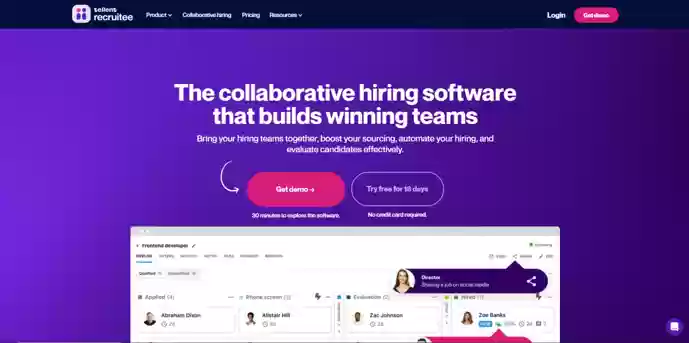
For quick recruitment teams, Recruitee is a friendly and hiring platform. With a focus on data-driven hiring, employer branding, and teamwork, it has a user interface that is simple to use and appealing to teams.
Best For: Team collaboration
Price: $269 per month
Rating: 4.6/5
Features:
- Team collaboration tools
- AI talent sourcing and pipelines
- Automated workflows and scheduling
- Employer branding career sites
Pros:
- Highly customizable and visually appealing career pages.
- Strong focus on team collaboration and reporting.
- Intuitive drag-and-drop pipeline management.
Cons:
- Higher starting price point than some SMB-focused tools.
- Sourcing features are less robust than dedicated tools.
3. Workable
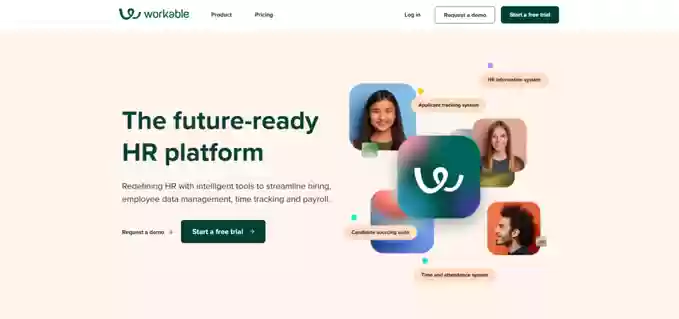
Workable’s core strengths rest on being among the most powerful sourcing platforms in the world, with extensive integrations and Workable AI screening capabilities that help thousands of companies quickly discover, evaluate, and hire candidates. From fledgling startups to large enterprises, the platform supports efficient, end to end hiring at scale.
Best For: Large companies
Price: $149 per month
Rating: 4.7/5
Features:
- AI-based screening and sourcing
- 200+ job board integrations
- Video interviews and assessments
- Hiring analytics and reports
Pros:
- Unmatched job posting reach and sourcing database.
- Very user-friendly for both recruiters and candidates.
- Scalable for growing companies.
Cons:
- Can be more expensive than competitors.
- Some advanced features require higher-tier plans.
4. Lever
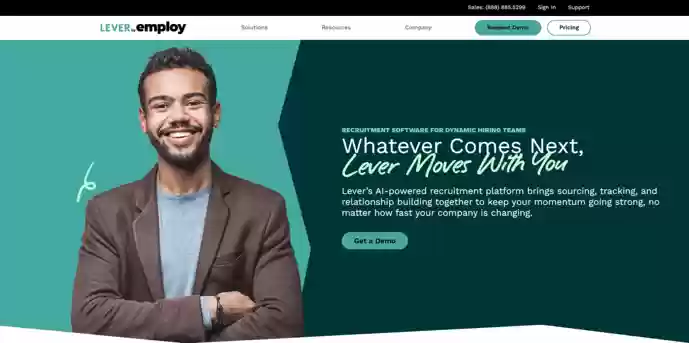
Lever is the leading talent acquisition software suite that integrates an applicant tracking system with a strong candidate relationship management (CRM) system. This unified approach is built for companies serious about building long-term relationships with active and passive candidates.
Best For: Building long-term talent pipelines
Price: Custom pricing
Rating: 4.5/5
Features:
- ATS + CRM in a single platform
- Talent relationship management
- Predictive analytics and insights
- Multi-channel communication
Pros:
- Excellent for engaging with passive candidates.
- Intuitive and modern user interface.
- Strong reporting on pipeline health.
Cons:
- Premium pricing model.
- Can have a steeper learning curve than simpler ATS.
5. Greenhouse
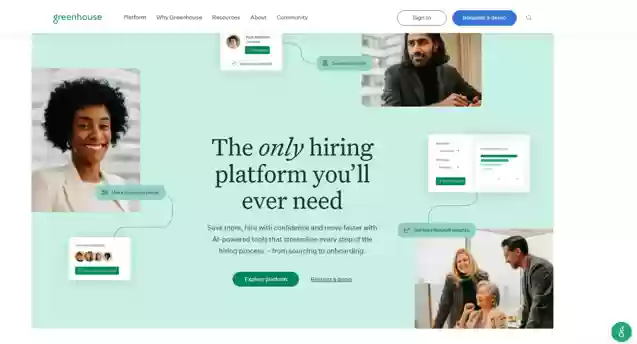
Among the products for enterprise-level recruiting, Greenhouse is simply the gold standard. It is an extremely configurable platform, fiercely committed to structured hiring that helps organizations decrease bias, improve their hiring decisions, and scale their processes efficiently.
Best For: Diversity-driven and structured hiring
Price: $300 per month
Rating: 4.6/5
Features:
- Diversity and inclusive hiring tools
- Structured interview kits and scorecards
- Candidate experience and onboarding
- Advanced analytics and integrations
Pros:
- The leader in promoting fair and structured hiring.
- Unmatched level of customization and reporting.
- Strong integration network.
Cons:
- One of the most expensive options on the market.
- Requires significant setup and buy-in to use effectively.
6. Ashby
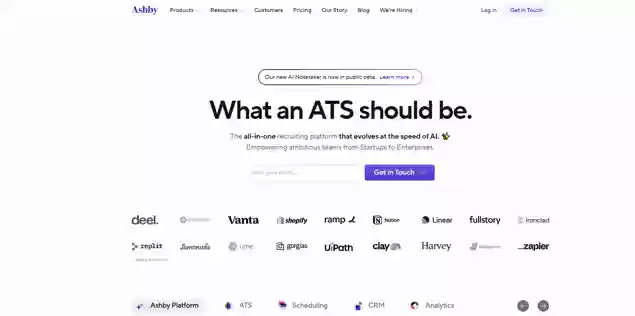
Ashby is an advanced platform that combines scheduling and an ATS into a stunning final result. It is designed for startups and tech companies that value data transparency and a smooth user experience for both candidates and recruiters.
Best For: Startups using AI
Price: $300 per month
Rating: 4.8/5
Features:
- AI-powered automation for hiring workflows
- ATS + CRM + scheduling in one
- Advanced data analytics and reports
- Smart candidate sourcing
Pros:
- Best-in-class, embedded analytics and reporting.
- Extremely intuitive and fast user interface.
- Excellent customer support and product vision.
Cons:
- Not designed for very large, non-tech enterprises.
- Custom pricing may be prohibitive for some.
7. GoHire

GoHire is a powerful hiring platform that simplifies the hiring process for small and medium sized businesses. It provides a wide variety of tools, including applicant tracking system, video interviews, and onboarding to assist small and medium sized firms in hiring outstanding employees.
Best For: Small businesses and startups
Price: $74 per month
Rating: 4.4/5
Features:
- Multi-job board posting
- Basic ATS and candidate tracking
- Team collaboration tools
- Simple hiring workflows
Pros:
- Integrated video interviewing and onboarding.
- Strong focus on UK market compliance.
- All-in-one solution reduces need for multiple tools.
Cons:
- Less brand recognition globally.
- May have more features than a very small business needs.
8. Perfect
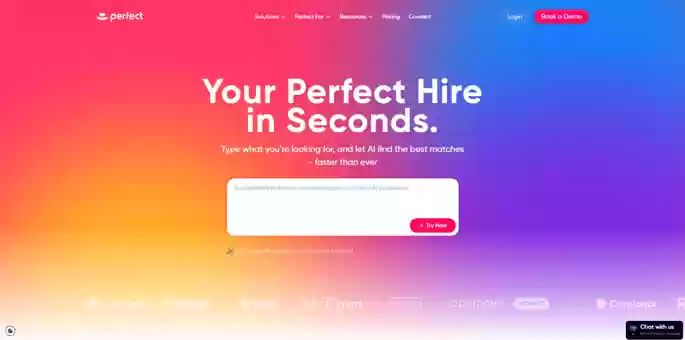
Perfect is a special platform that uses rtificial Intelligence for more than simply sourcing. It performs an accurate skills match and verification. By checking a candidate true skills in addition to their abilities, it helps businesses make better hiring choices and reduce down hiring errors.
Best For: AI-assisted hiring and HR automation
Price: Custom pricing
Rating: 4.7/5
Features:
- AI-based candidate screening
- Predictive hiring analytics
- Automated assessment tools
- CRM and pipeline management
Pros:
- Reduces bias by focusing on verified skills.
- Helps predict on-the-job performance.
- Unique approach to candidate evaluation.
Cons:
- A newer, less proven platform in the market.
- Focus on skills may overlook other important hiring factors.
9. Recruit CRM
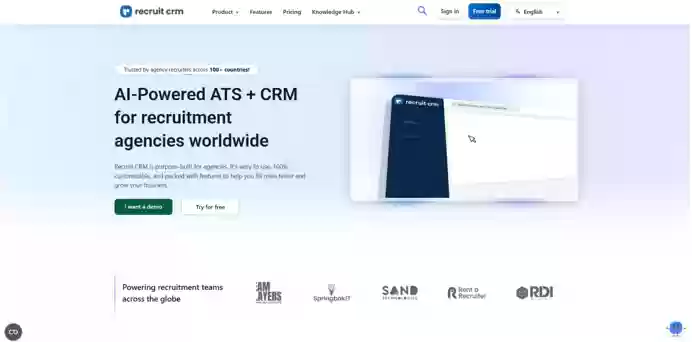
Recruit CRM is an ATS + CRM built specifically for recruitment agencies and executive search firms. It helps staffing agencies by combining powerful contact management, applicant tracking, and billing into one.
Best For: Staffing & recruitment agencies
Price: $85 per month
Rating: 4.8/5
Features:
- ATS + CRM for agency hiring
- Candidate sourcing and resume parsing
- Workflow automation
- Client & job management tools
Pros:
- Tailor-made for the workflow of recruitment agencies.
- Combates sales and recruitment processes seamlessly.
- Affordable for small to mid-sized agencies.
Cons:
- Not suitable for corporate/internal recruiting teams.
- Can be complex for very small agencies.
10. iCIMS
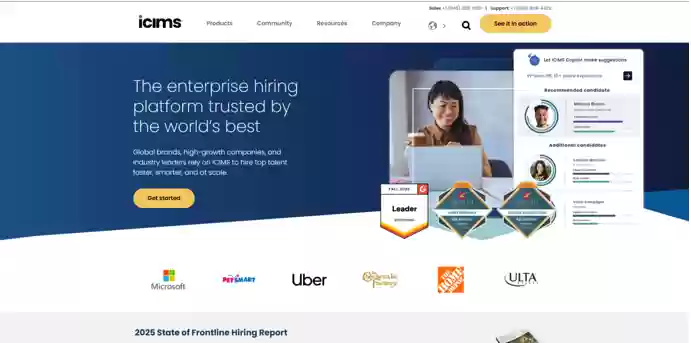
For very large enterprises with advanced and high-volume hiring needs, iCIMS is a powerfu and professional Talent Cloud platform. It's a complete solution for drawing in, interacting with, employing, and advancing talent globally.
Best For: Large enterprises and global hiring
Price: Custom pricing
Rating: 4.5/5
Features:
- Enterprise-grade ATS + CRM
- Onboarding and employee lifecycle tools
- AI talent matching and analytics
- Global hiring and compliance
Pros:
- Extremely powerful and scalable for global enterprises.
- Strong compliance and reporting capabilities.
- Handles high applicant volumes with ease.
Cons:
- Can be complex and require a dedicated admin.
- Higher total cost of ownership.
11. Jobvite

Jobvite is the industry-leading end-to-end talent acquisition suite that enables companies to attract and hire the best talent with its powerful ATS, recruiter CRM, engaging career sites, and video interviewing - built with a focus on the candidate experience.
Best For: Full recruitment cycle management
Price: Custom quote
Rating: 4.6/5
Features:
- Full ATS + CRM and onboarding
- AI sourcing and talent intelligence
- Employer branding tools
- Analytics and workflow automation
Pros:
- Strong focus on candidate experience and employer branding.
- Integrated suite reduces data silos.
- Good sourcing and pipelining capabilities.
Cons:
- Can be less intuitive than some modern competitors.
- Suite pricing can be high.
Final Thoughts:
Your company's size and hiring requirements will determine the kind of recruiting software you choose. JazzHR or Recruit CRM are options to think about for startups and small businesses. Lever and Recruitee are available to mid-sized teams. If you want to use automation and artificial intelligence then Ashby and GoPerfect are strong options. Lastly, for full-suite talent management and enterprise hiring firms can use Jobvite or iCIMS.
Additionally, hiring is easier and candidate experience is improved, hiring time is decreased, and overall HR efficiency is increased by investing in the appropriate recruitment tool.
Frequently Asked Questions (FAQs)
1. What is the main purpose of recruiting software?
Recruiting software is designed to speed up and automate the hiring process by handling job advertisements to candidate screening to interviews and communication. It enhances the whole candidate experience and reduces manual labor while helping teams in working more effectively and making hiring decisions more quickly.
2. What is the best hiring software for small businesses?
JazzHR and GoHire are the best solutions for recruiting software for small firms because of their core ATS features and ease of use. Small businesses that need CRM features in addition to application monitoring can also benefit from Recruit CRM.
3. Why should businesses spend money on AI hiring software?
Businesses may automate resume screenings and speed the hiring process by investing in AI-powered recruiting softwares. By analyzing data on candidate success forecasts and identifying the best candidates faster than with human techniques, artificial intelligence (AI) improves the decision making.
4. What separates talent acquisition software from applicant tracking systems?
Talent acquisition software includes the entire recruitment lifecycle, including onboarding, analytics and employer branding, whereas an application tracking system merely focuses on handling applicants through hiring stages. In contrast to an applicant tracking system (ATS), it is intended to develop into a complete hiring solution.
5. Can remote hiring be done with recruiting software?
Indeed, the majority of modern recruitment software supports remote hiring via digital tests, video interviews and virtual onboarding capabilities. Websites like Workable and Greenhouse offer complete remote hiring solutions that allow virtual interviews.
6. What is the average cost of recruiting software?
The features and size of a company determine how much recruiting software costs. While mid sized and advanced systems based on artificial intelligence cost between $150 and $400 per month while basic ATS platforms start at roughly $49 to $100 per month for small enterprises. Suites at the enterprise level could cost several thousand dollars a month.


 Table of Content
Table of Content




